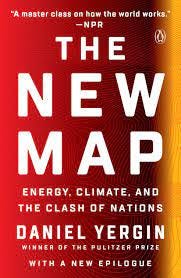Termination Shock
Getting things right has never been harder

This year's dramatic increase in record temperatures in the Atlantic and the fast retreat of the ice shelf might not be so much about human-caused heating accelerating post-covid but eliminating a source of human-caused cooling!
It is not news that human use of fossil fuels in the past centuries has been a massive (unintended and unwanted) geoengineering project that is making our planet warmer and warmer.
But humans have also been unintentionally geoengineering the planet to make the climate cooler, mainly through cloud formation, thereby increasing the amount of the sun's energy reflected into space. Aircraft create contrails that we see in the sky, but so do large ships that ply the oceans to deliver our goods. Ten years ago, scientists thought these “ship tracks” were not significant contributors to global cooling. The video from NASA below concludes:
The ship tracks themselves are too small to affect global temperatures, but they help us understand how larger pollution sources might change clouds on a bigger scale.
But, another unintentional bit of engineering geoengineering is proving otherwise. In 2020, a mandate for large ships to switch from high-sulfur (cheap) fuels to low-sulfur fuel kicked in full force.
Regulations imposed in 2020 by the United Nations's International Maritime Organization (IMO) have cut ships' sulfur pollution by more than 80% and improved air quality worldwide. The reduction has also lessened the effect of sulfate particles in seeding and brightening the distinctive low-lying, reflective clouds that follow in the wake of ships and help cool the planet. The 2020 IMO rule "is a big natural experiment," says Duncan Watson-Parris, an atmospheric physicist at the Scripps Institution of Oceanography. "We're changing the clouds."
—Science Magazine, August 23.
As a result, there are fewer clouds, and the oceans receive more energy. Read more from this Science article here.
This sudden stoppage of geoengineering that cools the planet is often called a Termination Shock: A sudden change that kills off life on Earth or creates a runaway greenhouse effect (Hello, Venus!). For the corals, invertebrates, and many other species in the Gulf and Atlantic, this mini-termination shock is the end of the line.
Termination shock is one of many good arguments against using global geoengineering to counter the planet's warming with geoengineering. We have the technology to start geoengineering the world (pumping chalk into the upper atmosphere seems the cheapest and most efficient), but I hope we never do. For me, the main reason is that it reeks of a "technical solution" that will let us continue to use fossil fuels at an unsustainable rate instead of addressing the core issue.
While discussing climate and fossil fuels, here are some of my recommendations for more information on this and related topics. Let me know yours in the comments or chat.
What the Fossil Fuel Industry Doesn't Want You To Know 📺
Geoengineering and "clean coal" have been promoted by fossil fuel companies in the most disingenuous and fraudulent way (they have known for forty years or more that clean coal was bullshit). Here Al Gore pulls no punches (finally) about the lies of this industry.
The New Map 📚
If Gore’s talk got you going, then this book will help you understand the enormity of the task of ending our fossil fuel addiction, and how entirely dependent we are on fossil fuels.
The New Map has many interesting stories to carry the reader forward, and I found it easy to read despite the geopolitical details (maps are included!). Yegin begins with the shale oil revolution in the US and then moves back and forth in time to describe the current energy landscape and how countries get their energy (or export it). The New Map is a fascinating book, and until I read this book, I did not understand the scope of issues around energy and climate change. The book also illuminates why certain countries align with other countries and why certain countries, such as the US, are putting sanctions on allies importing natural gas from sources such as Russia (Google “Nord Stream 2” for more info).
The first 70% of the book outlines the geopolitical maps of energy: America’s map, Russia’s map, China’s map, and Maps of the Middle East. The last part of the book provides a roadmap to the future of energy, discussing topics such as automation, electric cars, self-driving cars, and the climate challenge ahead. If you are interested in the politics of climate change, I would highly recommend this book.
Amazon Link: The New Map
Heated 🗞️
A sub-stack on climate change started by Emily Atkin. Lots of original reporting, but definitely with a perspective. For those of you in Tech, think of it like Kara Swisher but for climate.
Dr Gilbz 📺
This YouTube channel is run by Ella Gilbert a polar scientist, who’s mission is to turn the research about the polar parts of our planet into more simple language that we can all understand.
Termination Shock 📚
Stephenson has an uncanny ability to see where technology is going in his books and often predicts the future with great accuracy. It is no surpise that he has already written a book about climate change and geoengineering of the planet.
Stephenson provides historical and technical details on all places, technologies, and players in the story, so expect to learn a lot and go through several hundred pages of detailed descriptions of how the Dutch monarchy works, the biology of feral pigs, and many more topics. It also makes a good audio book.
Termination Shock is an informative imagining of the near future focusing on the geopolitics of climate change.
Amazon Link: Termination Shock





